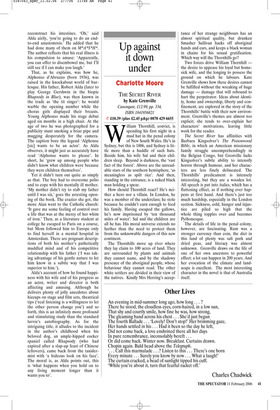Up against it down under
Charlotte Moore
THE SECRET RIVER by Kate Grenville
Canongate, £12.99, pp. 334, ISBN 1841956821
✆ £10.39 (plus £2.45 p&p) 0870 429 6655 William Thornhill, convict, is spending his first night in a mud hut in the penal colony of New South Wales. He’s in Sydney, but this is 1806, and Sydney is little more than a huddle of such huts. Beside him, his wife Sal and their children sleep. Beyond is darkness, the ‘vast fact of the forest’. Above are the unreadable stars of the southern hemisphere, ‘as meaningless as spilt rice’. And then, standing in the entrance, is a naked black man holding a spear.
How should Thornhill react? He’s neither a hero nor a villain. In London, he was a member of the underclass; he stole because he couldn’t earn enough to feed his family. Having escaped the gallows, he’s now imprisoned by ‘ten thousand miles of water’. Sal and the children are all he has. His moral universe extends no further than the need to protect them from the unknowable dangers of this new continent.
The Thornhills move up river where they lay claim to 100 acres of land. They are surrounded by plants and animals they cannot name, and by the shadowy presence of the aboriginal people, whose behaviour they cannot read. The other white settlers are divided in their view of the natives. Kindly Mrs Herring’s accep tance of her strange neighbours has an almost spiritual quality, but drunken Smasher Sullivan hacks off aboriginal hands and ears, and keeps a black woman in chains for his sexual gratification. Which way will the Thornhills go?
Two forces drive William Thornhill the desire to appease his loyal but homesick wife, and the longing to possess the ground on which he labours. Kate Grenville shows how these desires cannot be fulfilled without the wreaking of huge damage — damage that will rebound to hurt the perpetrator. Ideas about identity, home and ownership, liberty and confinement, are explored in the story of the Thornhills’ battle with their new environment. Grenville’s themes are almost too explicit; she tends to over-explain her characters’ motivations, leaving little work for the reader.
The Secret River has affinities with Barbara Kingsolver’s The Poisonwood Bible, in which an American missionary family struggle uncomprehendingly in the Belgian Congo, but Grenville lacks Kingsolver’s subtle ability to intensify horror through humour, and her characters are less finely delineated. The Thornhills’ predicament is intensely interesting, but they are a wooden lot. All speech is put into italics, which has a flattening effect, as if nothing ever happens at first hand. And there’s just too much hardship, especially in the London section. Sickness, cold, hunger and injustice are piled so high that the whole thing topples over and becomes Pythonesque.
The details of life in the penal colony, however, are fascinating. Rum was a stronger currency than coin, the diet in this land of plenty was salt pork and dried peas, and literacy was almost unknown. Grenville draws on the life of one of her own ancestors to powerful effect; a lot can happen in 200 years. And her evocation of the climate and landscape is excellent. The most interesting character in the novel is that of Australia itself.














































 Previous page
Previous page